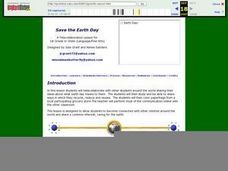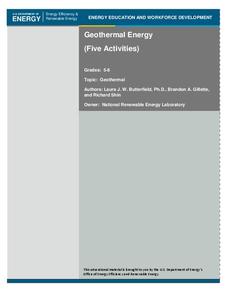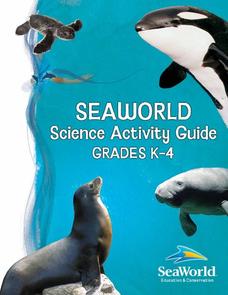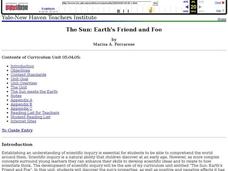Curated OER
Where in the World Is That Volcano?
Identify the Earth's major volcanoes with an earth science lesson plan. Elementary and middle schoolers locate major volcanoes on a world map. Then, in groups, they research how the volcano affects the region in which it is located.
Earth Day Network
Healthy Earth, Sick Earth
Earth is sick and needs our help! Read the children's book Planet Earth Gets Well to explain the various problems facing the planet, discussing what young conservationists can do to heal the planet along the way. A great Earth Day...
Baylor College
Modeling Earth's Atmosphere
Life on Earth is made possible by the unique composition of its atmosphere. Working collaboratively, a scale model is created as young scientists learn about the different layers of gas that surround the planet. Cards are included that...
NOAA
Earth Origami
After reading a brief history of Carl Skalak's journey on the open waters, scholars make a three-dimensional model of the Earth out of an Origami balloon using a printable decorated as the Earth.
Curated OER
Save the Earth Day
First graders tellacollaborate with other students around the world sharing their ideas about what earth day means to them. They share ways in which they recycle, reduce and reuse.
NOAA
The Climate Team: Make a Solar Heat Engine
Learners investigate how solar energy is converted into heat in part two of the 10-part Discover Your Changing World series. They build and test homemade solar cookers to boil water and cook rice. Pupils consider the impact of heat...
Curated OER
Earth from Space Maps
Students use photo images from space to create a large map of the United States or the world, find where they live and label other places they know. They are exposed to a Web resource that allows them to view photo images of Earth taken...
US Department of Energy
Geothermal Energy
With Earth Day quickly approaching, as well as many science fairs, why not challenge your class to investigate geothermal energy or other renewable energy resources? There are five driving questions explored in depth here, as well as...
Sea World
Seaworld Science Activity
A fun collection of activities about marine life would be a great addition to your elementary science unit. From cute penguins to scary sharks, the unit features crafts, experiments, and basic research projects that will teach your...
Ask a Biologist
It’s a Plankton Eat Plankton World
For as small as they are, plankton sure play an enormous role in maintaining marine ecosystems. Dive into an investigation of these tiny organisms with a hands-on life science activity in which children cut out pictures of sea animals...
NASA
Rain Gauge Activity
Complete teacher narrative and presentation slides for teaching about Earth's water make up the bulk of this lesson. Embedded within the slide show, you will find videos about the water cycle, keeping track of the limited supply of fresh...
California Academy of Science
Kinesthetic Astronomy: Moon Phases
We are the world! Each of your class members models Earth and holds a styrofoam ball to see its phases. Thorough teacher background information and a detailed lesson plan will make this a cinch to teach. If you do not want to purchase...
Curated OER
The Sun: Earth's Friend and Foe
Students study the structure and features of the sun. In this earth science lesson, students explain how the sun's energy drive the processes on Earth. They perform temperature conversions using appropriate equations.
PBS
Breaking it Down
After challenging themselves to correctly choose the form of erosion and length of time required for a given landform to develop, earth science class members model mechanical and chemical weathering with various lab demonstrations over...
Curated OER
Earth's Water
If the majority of our planet is covered with water, why do we need to bother conserving it? With a thorough and varied investigation into the location and types of water on the earth, learners will gain an understanding of why this...
NOAA
To Explore Strange New Worlds
It's time to boldly go where your class has not gone before! The introductory lesson in a five-part series takes young oceanographers aboard the NOAA Ship Okeanos to begin a study of ocean exploration. The lesson includes a comparison of...
Curated OER
Earth's Water: A drop in your cup
Students complete activities where they observe the amount of freshwater in the world as a fraction of the actual amount of water using different mixtures. In this freshwater lesson plan, students brainstorm on how to preserve freshwater.
ARKive
Adaptations for Movement
What animals are best suited for moving around a rainforest, or a desert? Design your own animal species based on a particular habitat, focusing on the characteristics it will need for optimal movement. Great as a group lesson or...
NOAA
Why Should I Care?: Show How Increased Carbon Dioxide Makes the Ocean More Acidic
How does a change in pH affect the ocean ecosystem? Scholars explore the idea by making an acid-base indicator in part seven of the 10-installment Discover Your Changing World series. First, they explore impacts of carbon dioxide in...
NOAA
Climate, Weather…What’s the Difference?: Make an Electronic Temperature Sensor
What's the best way to record temperature over a long period of time? Scholars learn about collection of weather and temperature data by building thermistors in the fourth installment of the 10-part Discover Your Changing World series....
NOAA
Communicate!: Create a Unique Message About Climate Change
Scholars use their communication skills to express their take on climate change in the ninth installment of the 10-part Discover Your Changing World series. They create ways to deliver their messages on a specific aspect of climate by...
Chicago Botanic Garden
Climate Change Around the World
It is unknown if cloud cover increases in response to carbon dioxide levels changing, helping climate change slow down, or if cloud cover decreases, allowing Earth to warm faster. Part four in the series of five lessons has classes...
Chicago Botanic Garden
Climate Change Around the World
You know climate change is happening when you see a bee take off its yellow jacket. Part four in a series of five lessons explores all factors affecting climate change: temperature, cloud cover, precipitation, and carbon dioxide. By...
Earth Day Network
Conserving Water Through Art!
Having fresh, clean drinking water is a privilege many people take for granted. Help raise awareness about the scarcity of water and the importance of conservation by discussing different ways water is used in everyday life. Brainstorm...

























